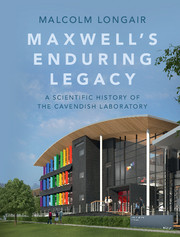Book contents
- Frontmatter
- Dedication
- Contents
- Preface
- Acknowledgements
- Part I To 1874
- Part II 1874 to 1879
- Part III 1879 to 1884
- Part IV 1884 to 1919
- Part V 1919 to 1937
- Part VI 1938 to 1953
- Part VII 1953 to 1971
- 13 The Mott era: an epoch of expansion
- 14 The Mott era: radio astronomy and high–energy physics
- 15 The Mott era: the growth of condensedmatter physics
- Part VIII 1971 to 1982
- Part IX 1984 to 1995
- Part X 1995 to present
- Appendix The evolution of the New Museums site
- Notes
- References
- Author index
- Subject index
13 - The Mott era: an epoch of expansion
from Part VII - 1953 to 1971
Published online by Cambridge University Press: 05 July 2016
- Frontmatter
- Dedication
- Contents
- Preface
- Acknowledgements
- Part I To 1874
- Part II 1874 to 1879
- Part III 1879 to 1884
- Part IV 1884 to 1919
- Part V 1919 to 1937
- Part VI 1938 to 1953
- Part VII 1953 to 1971
- 13 The Mott era: an epoch of expansion
- 14 The Mott era: radio astronomy and high–energy physics
- 15 The Mott era: the growth of condensedmatter physics
- Part VIII 1971 to 1982
- Part IX 1984 to 1995
- Part X 1995 to present
- Appendix The evolution of the New Museums site
- Notes
- References
- Author index
- Subject index
Summary
Nevill Mott's appointment as Cavendish Professor in 1954 marked the beginning of further changes of emphasis in the scientific direction of the Laboratory. While he worked closely with experimentalists, he carried out no experimental physics research himself, despite being Cavendish Professor of Experimental Physics. He was unquestionably the leading UK theorist in solid state physics and he was to consolidate and expand considerably both theory and experiment within the Laboratory.
Mott's pre-Cavendish days
Mott's pedigree in physics was impeccable. His parents, Charles Francis Mott and Lilian Mary Reynolds, had been research students in the Cavendish Laboratory, both appearing on the 1904 photograph of Cavendish graduate students. Mott read mathematics at St John'sCollege, Cambridge in 1924, which he completed with high distinction. His undergraduate studies spanned the dramatic years when quantum mechanics was discovered with its profound implications for physics at the atomic level –Mott was determined to master the new discipline. He was in the same college as Dirac and, despite Dirac's notorious reticence, benefitted from the presence of the only quantum theorist in Cambridge on the same level as the great European pioneers. Mott's PhD supervisor was Ralph Fowler, who arranged for him to spend the autumn of 1928 working with Bohr in Copenhagen. In the same year, he made his important contribution on the scattering probabilities of particles which obey Bose–Einstein statistics (Mott, 1928). Mott's predictions were confirmed by Chadwick'sexperiments (Blackett and Champion, 1931), which greatly impressed Rutherford (Section 9.3).
In 1929, Mott accepted Lawrence Bragg's offer of a lectureship at the University of Manchester, remarking in his autobiography that ‘Cambridge and Manchester were the only worthwhile schools of physics in the UK (with Bristol just beginning …)’ (Mott, 1986). Although he only stayed a year at Manchester, it was an important year for Mott intellectually. As he put it,
In fact, [the Braggs] were the originators of a new science, the scientific investigation of the structure of crystals, and that meant of most materials …[Lawrence] Bragg was the world leader in this subject. It was a change from Rutherford's Cavendish and indeed Bohr's Copenhagen, where the atom, the nucleus and the electron were the thing. Here one asked, and found out, how atoms were put together to form real materials.
- Type
- Chapter
- Information
- Maxwell's Enduring LegacyA Scientific History of the Cavendish Laboratory, pp. 321 - 334Publisher: Cambridge University PressPrint publication year: 2016



